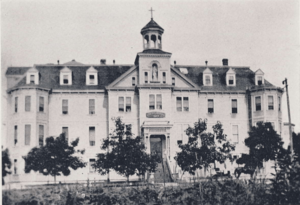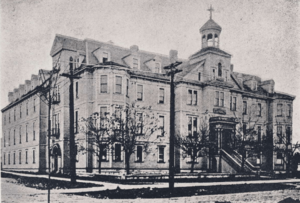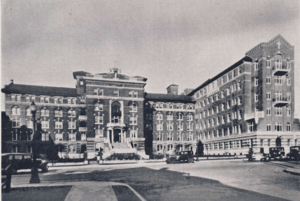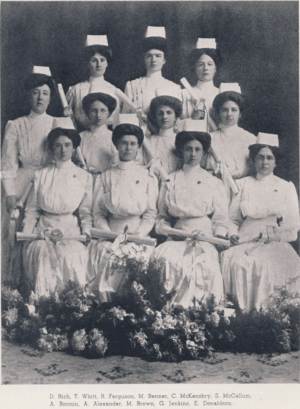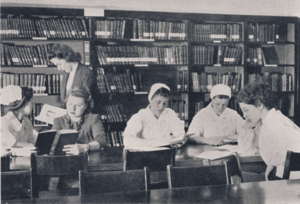St. Paul's Hospital (Vancouver) facts for kids
Quick facts for kids St. Paul's Hospital |
|
|---|---|
| Providence Health Care | |
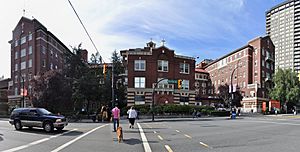 |
|
| Geography | |
| Location | 1081 Burrard Street, Vancouver, British Columbia, Canada |
| Coordinates | 49°16′50″N 123°07′40″W / 49.280431°N 123.127887°W |
| Organization | |
| Care system | Medicare (Canada) |
| Hospital type | Teaching, Academic |
| Affiliated university | UBC Faculty of Medicine |
| Services | |
| Emergency department | Yes, Level III trauma center |
| History | |
| Founded | 1894 |
St. Paul's Hospital is a major hospital in downtown Vancouver, British Columbia, Canada. It treats patients with serious illnesses and injuries. It is the oldest of 18 medical centers run by Providence Health Care, a group that provides care based on Roman Catholic values.
St. Paul's helps everyone, no matter their beliefs. The hospital has many medical programs. It is known for its excellent heart and kidney care. It is also a teaching hospital for the University of British Columbia's medical school, where new doctors learn their skills. About 4,000 people work at St. Paul's Hospital.
In 2020, the hospital's land in downtown Vancouver was sold for nearly $1 billion. The money from the sale is being used to build a new, modern St. Paul's Hospital in a different part of the city. The new hospital is planned to open in 2027.
Contents
History of St. Paul's Hospital
The first St. Paul's Hospital opened in 1894, only eight years after Vancouver became a city. It was started by a religious group called the Sisters of Providence. This group was known for building hospitals and schools across North America.
The first hospital was a small, 4-story wooden building with 25 beds. It was named after Bishop Paul Durieu. The Sisters of Providence promised to provide kind and caring treatment to anyone who needed it. This promise was soon tested when many people came to Vancouver during the Klondike gold rush in the 1890s.
Growing with the City
As Vancouver grew, so did the hospital.
- In 1906, it became one of the first hospitals to get an X-ray machine.
- In 1907, it opened a school to train nurses.
- In 1912, the original wooden building was replaced by a stronger, fireproof building with 120 beds.
- In 1931 and 1945, new wings were added, bringing the total number of beds to over 500.
By the 1970s, St. Paul's was a major hospital for the whole province, offering special medical services. To make more space, two 10-story towers were built next to the main building in 1983 and 1991.
Modern Times
The hospital building is old, which makes it hard to work in. For example, the radiology department (where X-rays are taken) is far from the emergency room. The building also needs updates to make it safer in case of a fire or earthquake.
Because of these challenges, a plan was made to build a new hospital.
A New Hospital for Vancouver
For many years, people talked about updating St. Paul's. In 2015, the government and Providence Health Care announced that a brand-new hospital would be built on a new site near False Creek.
The new location will be a large health campus. It will have a hospital with 548 beds, which is more than the old one. It will also offer many other services, including:
- A 24/7 primary care clinic
- Mental health programs
- Outpatient clinics for appointments
- Research and teaching centers
- End-of-life care
St. Paul's School of Nursing
The hospital opened its own nursing school in 1907 because it needed more nurses. Women between 20 and 30 years old who were healthy and had a "good character" could apply.
Students lived at the hospital and went through a 3-year training program. They learned the basics of nursing and took classes in subjects like anatomy, psychology, and ethics. After passing an exam, they received a diploma. The school was known for being very strict.
The school started accepting men in 1951. It closed in 1974 because nurse training moved to colleges and universities.
Research at St. Paul's
St. Paul's is a center for medical research. It is home to the Providence Healthcare Research Institute and the Centre for Heart Lung Innovation. Scientists and doctors at St. Paul's work to find new ways to treat diseases and improve people's health.
 | Victor J. Glover |
 | Yvonne Cagle |
 | Jeanette Epps |
 | Bernard A. Harris Jr. |



